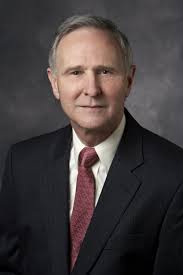Eric Hanushek doesn’t buy the conventional wisdom on education. Spending more doesn’t equal better outcomes, smaller class size doesn’t mean students improve, and teachers should be evaluated and fired if they can’t produce gains in the classroom.
Hanushek has been studying school spending and efficiency for decades as a professor of economics and a research fellow at places like Yale, Harvard, and the U.S. Air Force Academy. He’s currently the Paul and Jean Hanna Senior Fellow at Stanford University’s Hoover Institute. He is scheduled to speak to at a luncheon with Kansas lawmakers about his passion: improving the performance of students.
Student outcomes haven’t improved over the last 50 years.
“We’ve spent more money. We’ve spent a lot more money, but we haven’t gotten anything for it,” Hanushek says.
Student performance has a huge economic impact, he says. Schools support the economy, and test scores are a good measure of how much an adult will earn later in life.

“It turns out these test scores that everybody complains about are quite actually correlated to how a person will do later in life,” he says. “We know people who score better on these standardized tests earn more in the labor market.”
Hanushek will meet with Kansas lawmakers during a luncheon today, and the topic of conversation will include the constitutional showdown between the legislature and the state Supreme Court. The Court ruled Kansas’ school financing formula unconstitutional and gave lawmakers an April 30 deadline to submit a new formula. Officials estimate lawmakers will need to increase state education funding by $600 million to appease the Court. Hanushek says policymakers shouldn’t be focused on how much money to spend on schools.
“I think that’s a bad thing to be arguing over. What all the evidence suggests is very simply fact: How you spend money is more important than how much you spend,” he says. “If you don’t spend it efficiently, you don’t get results.”
The Kansas Supreme Court’s school funding ruling seeks funding necessary for students to meet or exceed the Rose standards. The Rose standards were created in an education lawsuit in Kentucky. Hanushek calls the standards “vague.”
“They say students should have all the skills to do well in society. They say students should be self aware. They are not standards that are in fact going to guide any real policies and better performance,” Hanushek says.
Funding should be tied to performance, and nothing is more critical to a school’s success than the quality of its teachers.
“Effective teachers are really powerful. Ineffective teachers are really harmful,” the professor explains.
However, education advocates have been focusing on things like reducing class size. He traces the race to small class sizes back to politics. Former California Gov. Pete Wilson mandated reduced class sizes in his state in 1996, and his popularity doubled. Governors in other states followed suit, but Hanushek says the focus on student-teacher ratios is a mistake.
“It’s one of the most expensive things we can do, and there’s very little evidence that it produces any gains. Teacher effectiveness is much more important than class size,” he says. “If as a parent you have a choice between a good teacher with a class of 30 and a class of 15 with a mediocre teacher, there’s no question which you should choose. Teacher quality is more important.”
A more effective policy would include larger class sizes led by well-paid, effective teachers. Hanushek admits hiring effective teachers isn’t as easy as gathering resumes and conducting interviews. He recommends a rigorous teacher evaluation process after teachers are in a classroom.
“At least the very good teachers and very bad teachers are very obvious. From the principal to the teachers to the kids and the parents, everyone knows who are the very good and very bad teachers in a school,” he says. “We have a system now that doesn’t make use of that information.”
Teachers should be evaluated using observation and metrics including testing. If a teacher can’t show that his students are improving, he should be fired. Good teachers and schools should be rewarded, but the existing system makes that nearly impossible.
If Kansas kids test at levels comparable to the best performing state, Massachusetts, the Sunflower State’s economy would grow faster. Over the next 80 years, income per capita would be 7 percent higher than it is today.
“If you have concerns about government deficits and tax policies, 7 percent takes care of a lot of concerns,” Hanushek says. “What the research suggests is that the costs of not doing anything are really large, because the state economy will look much different if the state doesn’t deal with the quality of teachers.”



